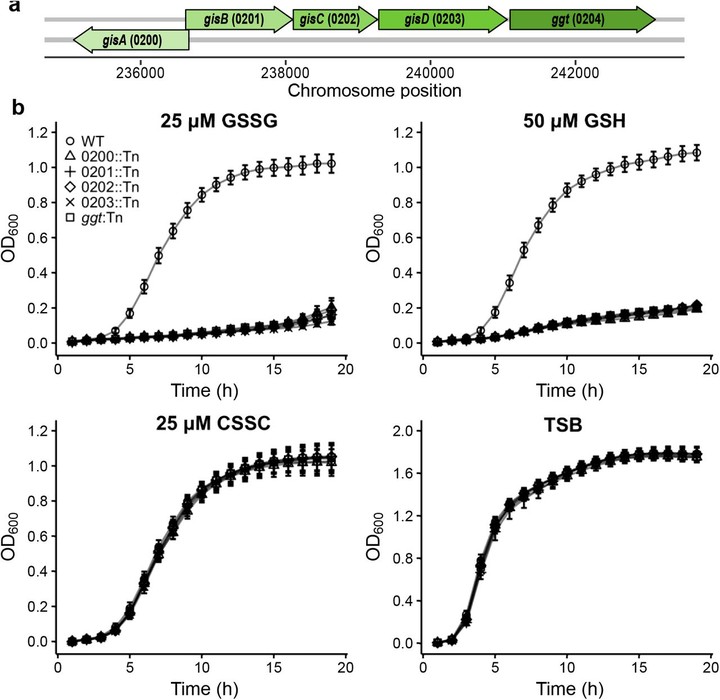The glutathione import system satisfies the Staphylococcus aureus nutrient sulfur requirement and promotes interspecies competition
 GisABCD is conserved in exclusive staphylococci and promotes competition in GSH- or GSSG-supplemented media. a, Heatmap depicting percent similarities of GisABCD-Ggt proteins across Staphylococci (S. aureus Gis-Ggt proteins were used as the starting points for the homology searches). b, In vitro competition experiments between S. aureus and S. epidermidis strain RP62a. The line represents the mean competitive index for each individual trial. Error bars represent ± 1 standard error of the mean. * Indicates p-value <0.05 as determined by one-way ANOVA with Tukey’s multiple test correction.
GisABCD is conserved in exclusive staphylococci and promotes competition in GSH- or GSSG-supplemented media. a, Heatmap depicting percent similarities of GisABCD-Ggt proteins across Staphylococci (S. aureus Gis-Ggt proteins were used as the starting points for the homology searches). b, In vitro competition experiments between S. aureus and S. epidermidis strain RP62a. The line represents the mean competitive index for each individual trial. Error bars represent ± 1 standard error of the mean. * Indicates p-value <0.05 as determined by one-way ANOVA with Tukey’s multiple test correction.
Abstract
Sulfur is an indispensable element for proliferation of bacterial pathogens. Prior studies indicated that the human pathogen, Staphylococcus aureus utilizes glutathione (GSH) as a source of nutrient sulfur; however, mechanisms of GSH acquisition are not defined. Here, we identify a previously uncharacterized five-gene locus comprising a putative ABC-transporter and γ–glutamyl transpeptidase (ggt) that promotes S. aureus proliferation in medium supplemented with either reduced or oxidized GSH (GSSG) as the sole source of nutrient sulfur. Based on these phenotypes, we name this transporter the Glutathione import system (GisABCD). We confirm that Ggt is capable of cleaving GSH and GSSG γ–bonds and that this process is required for their use as nutrient sulfur sources. Additionally, we find that the enzyme is cell associated. Bioinformatic analyses reveal that only Staphylococcus species closely related to S. aureus encode GisABCD-Ggt homologues. Homologues are not detected in Staphylococcus epidermidis. Consequently, we establish that GisABCD-Ggt provides a competitive advantage for S. aureus over S. epidermidis in a GSH-dependent manner. Overall, this study describes the discovery of a nutrient sulfur acquisition system in S. aureus that targets GSH and promotes competition against other staphylococci commonly associated with the human microbiota.